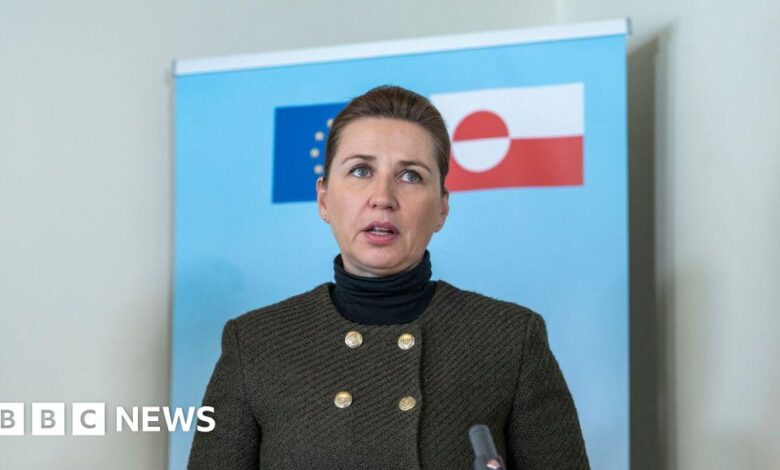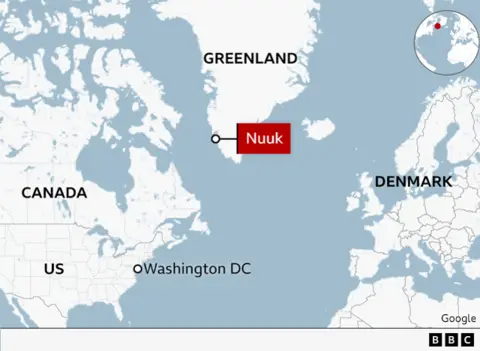Denmark struggles to stay calm in the face of Trump’s threat to occupy Greenland

 Getty Images
Getty ImagesCopenhagen’s gloomy January weather matched the mood of Danish politicians and business leaders.
“We take this situation very seriously,” Foreign Minister Lars Løkke Rasmussen said of Donald Trump’s threat to buy Greenland – and punish Denmark with high tariffs if it stands in the way.
However, he added, the government “has no ambition to escalate some war of words”.
Prime Minister Mette Frederiksen downplayed Trump’s suggestion that the US could use military force to take over Greenland. “I had no illusions to imagine that it would get there,” she told Danish television.
And Lars Sandahl Sorensen, CEO of Danish Industry, also said “there is every reason to stay calm… no one is interested in a trade war”.
But behind the scenes, hastily organized high-level meetings took place in Copenhagen throughout the week, reflecting the shock caused by Trump’s remarks.
Greenland Prime Minister Mute Egede flew to meet both the prime minister and King Frederik X on Wednesday.
And on Thursday night, party leaders from across the political spectrum gathered for an extraordinary meeting on the crisis with Mette Frederiksen in the Danish parliament.
Faced with what many in Denmark called Trump’s “provocation”, Frederiksen has generally tried to strike a conciliatory tone, repeatedly referring to the US as “Denmark’s closest partner”.
 AFP
AFPShe added that it is “natural” for the US to be interested in the Arctic and Greenland.
However, she also said that any decisions about Greenland’s future must belong to its people alone: ”Greenland belongs to the people of Greenland… and it is the people of Greenland who must determine their own future.” .”
Her cautious approach is twofold.
On the one hand, Frederiksen wanted to avoid escalating the situation. She’s been burned before, in 2019, when Trump canceled a trip to Denmark after she said his proposal to buy Greenland was “absurd.”
“Back then he was only in power for another year and everything was back to normal,” veteran political journalist Erik Holstein told the BBC. “But maybe this is the new normal.”
But Frederiksen’s comments also speak to Denmark’s determination not to interfere in the internal affairs of Greenland – an autonomous territory with its own parliament and a population increasingly leaning towards independence.
“She should have been much clearer in rejecting the idea,” said opposition MP Rasmus Jarlov.
“The level of disrespect by the incoming president of the United States towards these very, very loyal allies and friends has set a record,” he told the BBC, although he acknowledged Trump’s strong will had “surprise everyone”.
The conservative MP believed that Frederiksen’s insistence that “only Greenland… can decide and determine the future of Greenland” placed too much pressure on the island’s residents. “It would be prudent and prudent to stand behind Greenland and state clearly that Denmark does not want it [a US takeover].”
 AFP
AFPThe question of Greenland is a delicate one for Denmark, whose prime minister only recently formally apologized for leading a social experiment in the 1950s in which Inuit children separated from his family to be re-educated as a “model Dane”.
Last week, Greenland’s leader said the territory should free itself from the “chains of colonialism”.
In doing so, he tapped into growing nationalist sentiment, fueled by Greenland’s younger generation’s interest in indigenous Inuit culture and history.
Most commentators now expect a successful independence referendum in the near future. While for many this may be seen as a victory, it could also open up a new set of problems, as 60% of Greenland’s economy depends on Denmark.
An independent Greenland “will need to make choices,” says Karsten Honge. The Social Democratic MP now fears his preferred option of a new Commonwealth-style treaty “based on equality and democracy” is unlikely to happen.

Sitting in his parliamentary office decorated with poems and paintings depicting Inuit life, Honge said Greenland will need to decide “how much it values independence.” “It could cut ties with Denmark and turn to the US, but if you cherish independence that doesn’t make any sense,” Honge said.
Opposition MP Jarlov argued that while there was no point in forcing Greenland to become part of Denmark, “it was very close to becoming an independent country”.
Its capital Nuuk is self-governed, but relies on Copenhagen for currency management, foreign relations and defense – as well as significant subsidies.
“Greenland today has more independence than Denmark has from the EU,” Jarlov added. “So I hope they’ll think it through.”
Since Mette Frederiksen has the awkward task of responding firmly while not insulting Greenland or the United States, the strongest rebuttal to Trump’s comments so far has come from outside Denmark.
The principle of inviolability of borders “applies to every country… regardless of whether it is a very small country or a very powerful country”, German Prime Minister Olaf Scholz warned, while Foreign Minister Olaf Scholz warned French President Jean-Noël Barrot said that the EU would not allow other countries to “attack its sovereign borders”.
Their comments revealed deep concerns within the EU about how Trump’s upcoming presidency will be handled. “This is not only very serious for Greenland and Denmark but also serious for the whole world and the whole of Europe,” said MP Karsten Honge.
“Imagine a world – which we could be facing in just a few weeks – where international agreements do not exist. That would shake things up and Denmark would be just a small part of there.”
Similarly, Denmark’s trade sector was also deeply worried after Trump said he would “tax Denmark at a very high rate” if the country refused to cede Greenland to the US.
A 2024 Danish Industry study found that Denmark’s GDP would fall by 3 points if the US imposed a 10% tax on imports from the EU to the US as part of the global trade war.
Removing Danish products from the flow of EU goods would be almost impossible for the US and would almost certainly lead to retaliatory measures from the EU. But commercial industry professionals are left with little chance, and in Denmark as elsewhere on the continent, huge amounts of resources are being spent internally to plan for possible outcomes. occurred during Donald Trump’s second term in the White House.
As his inauguration approaches, the Danes are preparing as best they can to weather the storm. It is certainly hoped that the president-elect may soon shift focus to grievances with other EU partners and that the Greenland issue may be shelved for the time being.
But the unease caused by Trump’s refusal to rule out military intervention to occupy Greenland remains.
Karsten Honge said Denmark would have to bear any US decision.
“They just need to send a small warship along the coast of Greenland and send a polite letter to Denmark,” he said.
“The last sentence would be: Denmark, what are you going to do about it?
“That is the new reality regarding Trump.”





